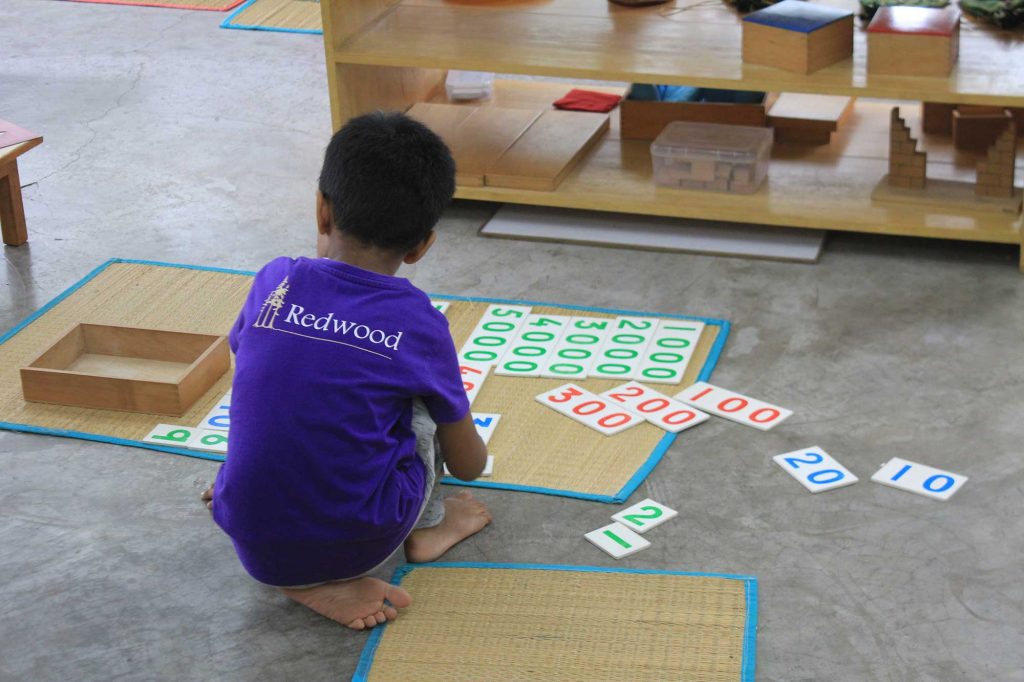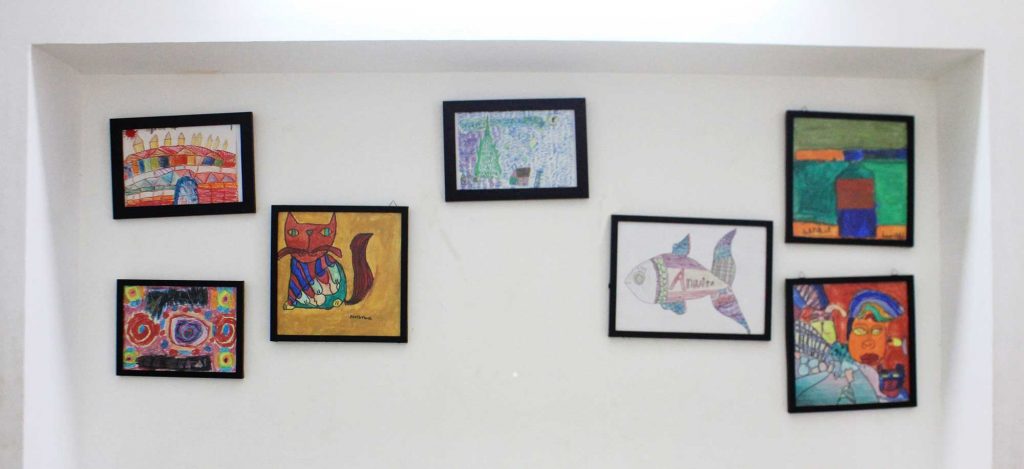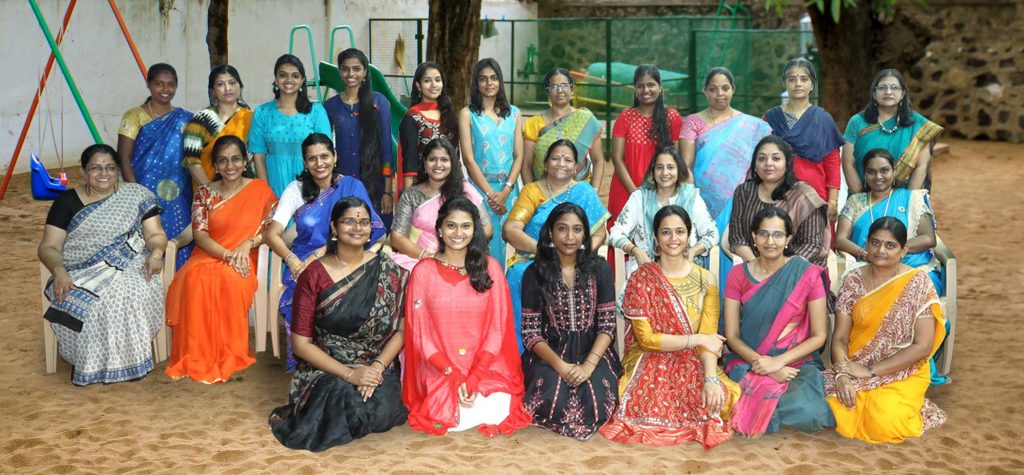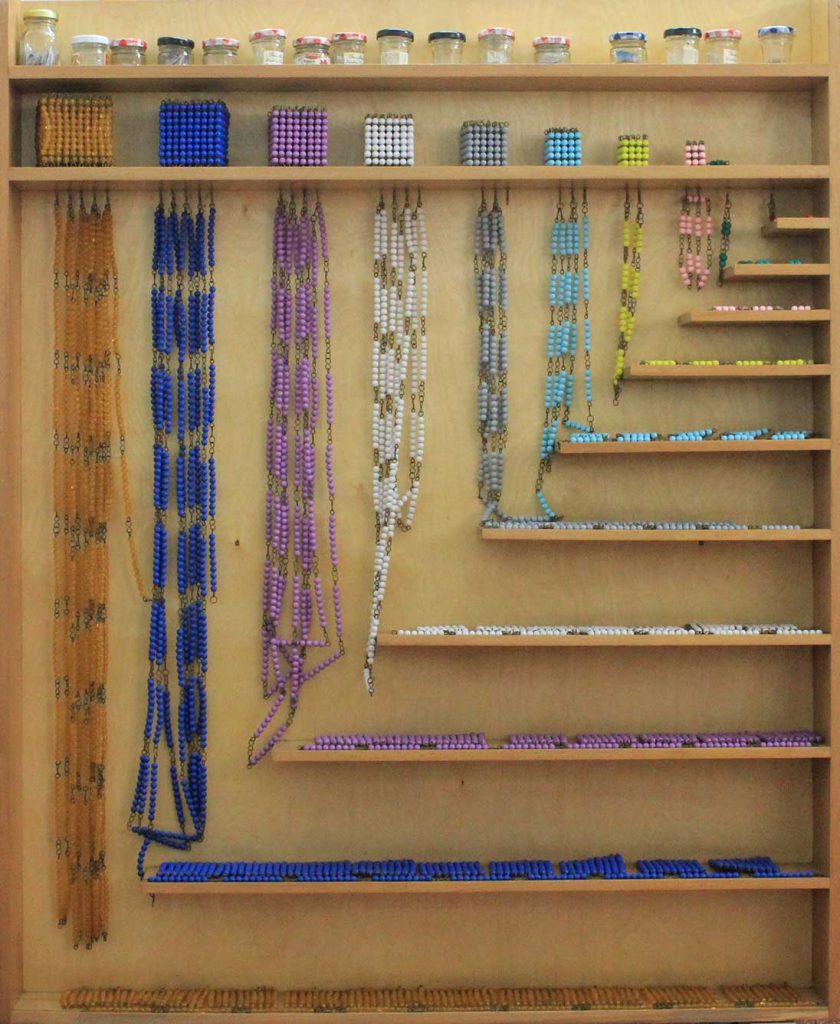When you walk into Redwood Montessori, the first thing that will get your attention are the heart-warming and lively artistic works of the students on display. The Montessori was established in 2011 with 11 children and has now become a well-known institution just through word-of-mouth. Hands-on teachers and founders Shankari Kamakshi Subbiah and Madhura Visweswaran speak to Team Culturama about their passion and goals.
 They say it takes a village to raise a child – what are your views on it?
They say it takes a village to raise a child – what are your views on it?
It is a beautiful African proverb and we agree with it unreservedly. With the breakdown of the joint family system, emergence of the nuclear families and couples migrating to new cities with no familial support, this has become essential. Dr Montessori believed that we live in a world village, we must honour the work of those who came before us and support one another.
Education doesn’t mean only academics, it is the all-round development of a child. Not just the teachers, but parents, grandparents, nannies and the Montessori akkas have a vital role to play to help children navigate this ever-changing world, showing them how to focus not only on their needs but also on the needs of the larger community.
What are your views on nannies helping with raising children?
Having a nanny is a personal choice, depending on one’s economic status, necessity, and so on. Nannies must be empowered to contribute to the development of the child. Nannies can speak to the children in Tamil or their native tongue, teach them life-skills, for example, making kolams, threading flowers, etc. Like we train our akkas at Redwood to help the child in their journey to become independent, we can train nannies too, If parents request. At Redwood, our akkas are well-trained individuals. They are highly respected by our children. We train them in-house, have regular medical check-ups and send them to seminars organised by other Montessori organisations, so that they understand the philosophy behind the method ‘Never help a child with a task at which he feels he can succeed’.
 Please share a little about Redwood Montessori’s history and your approach towards education.
Please share a little about Redwood Montessori’s history and your approach towards education.
We both started our careers under Kamini Sundaram. In 2011, the plan to start Redwood came together organically, with guidance from our mentor, N. Kumar, Vice Chairman of the Sanmar Group. As partners we may disagree sometimes, but we are firm with our beliefs and philosophies. Our motto is to promote the Montessori method and philosophy with well-curated classrooms, highly qualified professionals and caregivers.
We have three sections; the Toddler, Primary and Elementary. Each age-group has an environment that is created according to their needs and natural skills. In the Toddler environment, it is common to see 12-18 month-olds feeding themselves, using the toilet and doing a variety of activities with minimal assistance. For the toddler community we have designed our environment such that there is a designated area much like a home to eat, play, sleep, read and clean up without help. This then carries to the Primary, where apart from being functionally independent, they learn life-skills, teamwork, respecting each other’s achievements, reading and writing in three languages, and math.
 What do you think is your unique quality, which makes you stand apart from your peers?
What do you think is your unique quality, which makes you stand apart from your peers?
We are a small community of teachers, caregivers and parents who are committed to one person: the child. Even the term ‘redwood’ is from the famous California Redwood trees, which are known for their tall stature and strong foundation. Just like what we expect a child to achieve.
At Redwood, the child is surrounded by skilled professionals and appropriate materials. They are made to feel safe and secure at all times. We do not shame, punish or label a child. However we encourage them to express themselves without self-doubt, and help them through the ups and downs with calm conversations. We believe that children should know their self-worth, without depending on the approval of others. The adult has to give respect to the child to receive it. We check our egos at the door and have to be open to change. To give an example, we teach how to write formal letters in the Elementary and the first thing a group of students did was write a well-worded letter asking us to change the menu. The fact that the children were able to express effortlessly and with clarity, was the highlight of our day. Needless to say, we immediately changed the menu.
Education for a certificate is great, but what about education for living?
In today’s climate, academics has taken precedence. It is important, however at Redwood, it is not the sole focus. Life-skills, independence, self-worth, empathy, social awareness, sports, music, art, critical and creative thinking, etc., are also focused on with the same importance. Recently our Elementary students had organised a sleepover. We gave them a budget. The students themselves planned the invitations and all that they would need to make the sleepover a success. They ensured that the teachers, akkas and annas were also given food and coffee without anyone asking them to. This shows their empathy and kindness. They had to calculate, work as a team, i.e., using math, critical thinking and writing. Therefore what they had learnt in the classrooms was implemented seamlessly.
How can parents contribute to a child’s learning process?
Parents are an integral part of the learning process and have a considerable effect on how much or how little their children learn. It is important for parents to understand the Montessori philosophy before they choose such an environment. As the child grows older, there can be an imbalance between parents’ expectations and what their child is doing at school. Comparisons may arise between children from different schools, with academics being the only focus. The anxiety that the parents feel is natural. The only solution is to have faith in the school and the teachers, but, more importantly, have faith in their child’s own ability to achieve at their pace.
What do you think is the impact of technology among kids?
According to Dr. Montessori and neurologists today, maximum brain development is between birth and six years. In his book, Brain Rules for Baby: How to Raise a Smart and Happy Child from Zero to Five, Dr. John Medina speaks about zero exposure to screen time below the age of two. He explains how this sensory overload of images via a screen affects a child’s brain. Instead he talks about exposing the child to the right toys and books at an early age. Redwood believe in this approach a 100 percent.
Parents have a significant responsibility in that as they are the child’s most vital role models. Surround the children with the right books and toys, which will make them calmer. After the age of four, it is difficult to keep children away from gadgets altogether, but decide on the time and content carefully and consciously. Less exposure to gadgets at a young age leads to children with appropriate fine and gross motor skills, communication skills and the ability to keep themselves occupied.
 What would you say are your greatest achievements?
What would you say are your greatest achievements?
There is no place for judgement at Redwood. We do not label children and treat each one with the same amount of respect and care, recognising and celebrating their uniqueness. We try and equip the child to be confident, independent and empathetic in every way possible.
We both believe that our greatest achievement is when a child doesn’t depend on us. When they leave Redwood, we miss them, but feel we are on the right track when we see how well they adapt outside. Our children come out of the Toddler environment with a wide vocabulary and functional independence. They complete the Primary environment with the ability to sow and do gardening, and their academic skills are on par with any child of their age from an international board. In the Elementary environment, they leave with great knowledge, independence and the ability to adapt anywhere.
What does the future hold for you?
Our vision is to have child centric facilities, which houses students till grade 10, following an international curriculum. Nothing brings us more joy than knowing that our students are successfully thriving outside, making a mark as empathetic and responsible individuals.
Kiddie’s corner:
I like the garden the most. I love playing with my friends there.
– Arjun, 5.9 years
I like the aunties. They are the best teachers – Dhvani, 6 years
I love to make art and learn new things
– Liya, 3.4 years
Redwood Montessori currently has three campuses, two in Besant Nagar and one in Kottivakkam. They will have an open house on Vijayadashami for parents interested in learning about Redwood and enrolling their children.
Date: October 8, 2019 (Tuesday) | Time: 10 AM to 3 PM
Campus 1: Vasantha, 9840082140, redwood1@redwoodmontessori.in | Campus 2: Asha, 9840038860, redwood2@redwoodmontessori.in | Campus 3: Sowparnika, 9940583666, redwood3@redwoodmontessori.in
Website: www.redwoodmontessori.in
Instagram: redwoodmontessorichennai

INTERESTING 😀Best👍💯 wishes
I,Venkat and my wife Srimathi, have a baby who has just turned one year this month.We both are working professionals and have a helping hand to take care of our baby currently.We heard about your school from our close personal friend whose child is studying here and had given very high feedback. We would want to enrol our child in your institution, please let us know when we can visit your place and any specific timing to get more details about the institution- our contact no 9840975499/9962086486